
fno.org
|
|
| Vol 17|No 5|May 2008 | |
| Please feel free to e-mail this article to a friend, a principal, a parent, a colleague, a teacher librarian, a college professor, a poet, a magician, a vendor, an artist, a juggler, a student, a news reporter or to anyone else you think might enjoy it. | |
After NCLB:
By Jamie McKenzie |
 The recent obsession with reading and math in the USA fostered by the narrow minded NCLB law has turned attention away from serious problems with comprehension, understanding and thinking skills that have plagued us for decades when measured by the NAEP tests - the National Assessment of Educational Progress. Note article, "Adolescent Literacy: Putting the Crisis in Context" by Jacobs, Vicki A, in the Spring 2008 issue of The Harvard Educational Review. |
| When both political parties joined forces in Congress and authorized NCLB to impose a national regime of test driven learning on this generation of children, it was the worst educational policy decision of two centuries. The damage done is huge and the failures many. Fortunately, the insanity of this kind of narrowly defined education has finally dawned on most people. NCLB is finished. The next decade promises a return to a full-bodied kind of schooling - one that engages students in building the comprehension skills that have declined in recent years. We can also look for policies that encourage students to remain in school rather than drop out in frustration.
Why Comprehension? Few citizens noticed the decline in thinking across the nation as the NCLB juggernaut rolled across the nation, sweeping away decades of progressive practice in the name of so-called research-based instruction. If you teach students nothing but scoring well on dumbed down tests, it should surprise few that the results will be disappointing. Those states like Connecticut that set high standards and employed challenging tests were urged to switch to cheaper tests that measured less worthy goals. The net result of NCLB has been the dumbing down of a nation's schools and schooling as the policy stressed punishment, shame and public humiliation as motivators. Children, especially the poor and the economically disadvantaged, have been robbed of their educational birthright as schools served double and triple doses of math and reading while eliminating recess, social studies, science and thinking. Note article, "Faking Reform." Comprehension across a dozen categories of information requires that students be able to make inferences and think for themselves. They cannot get by with patterns memorized after thousands of pages of worksheets. Drill and kill learning prepares them for low level testing, but not for the test of life or the kinds of items on the National Assessment of Educational Progress. (See sample test items.) Those states that bent to the pressures of NCLB dumbed down their tests and ultimately their students as proficiency levels rose on the state tests but declined on NAEP. Our nation's children and schools deserve much better treatment. Evidence of Decline and Failure
Education Week reported a growing problem "The study by Policy Analysis for California Education, a nonprofit research group based at the University of California, Berkeley, was released here during the annual meeting of the American Educational Research Association. The researchers compiled state and federal testing results for the period 1992 to 2006 from 12 states: Arkansas, California, Illinois, Iowa, Kentucky, Massachusetts, Nebraska, New Jersey, North Carolina, Oklahoma, Texas, and Washington. What Comes Next? With Congress arguing over (and delaying) the re-authorization of No Child Left Behind, there is some evidence that the original enthusiasm for NCLB has been replaced by disillusionment and disaffection. A strong current running through those feelings is resentment toward Washington's strong arm approach to state governments and the imposition of policies by distant bureaucrats. The overly zealous focus on testing as a silver bullet has produced none of the results predicted by its proponents but many other consequences that have dismayed a wide array of parents and educators. Regardless of which party wins the White House or controls the Congress next term, we can expect that there will be a backing away from the heavy handedness of the first NCLB and a move toward restoring state control of educational policy. |
|
|
Copyright Policy: Materials published in From Now On may be duplicated in hard copy format if unchanged in format and content for educational, nonprofit school district and university use only and may also be sent from person to person by e-mail. This copyright statement must be included. All other uses, transmissions and duplications are prohibited unless permission is granted expressly. Showing these pages remotely through frames is not permitted. |
|

Info
 While Washington made dubious claims of progress due to NCLB, the evidence spoke quite eloquently of failure. The NAEP results were pretty much flat while other indicators were quite alarming. Propaganda replaced authentic reporting of results.
While Washington made dubious claims of progress due to NCLB, the evidence spoke quite eloquently of failure. The NAEP results were pretty much flat while other indicators were quite alarming. Propaganda replaced authentic reporting of results.